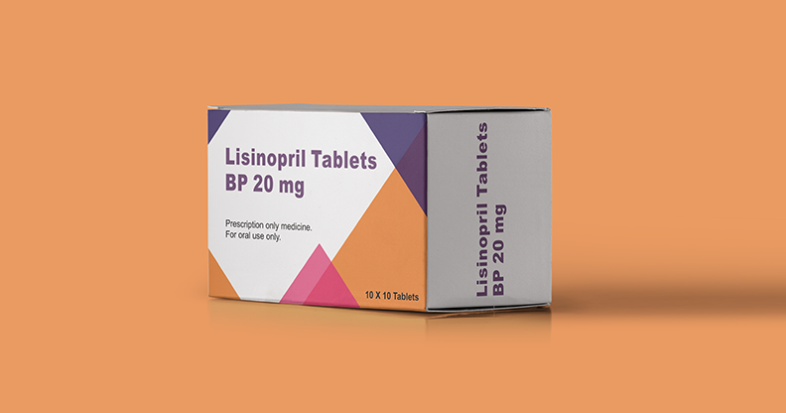LISINOPRIL TABLETS BP 20 MG

Lisinopril 20 MG TABLETS
COMPOSITION:
Each Uncoated Tablet Contains:
Lisinopril Dihydrate BP
Eq. to Lisinopril 20 mg
Excipients Q.S.
DRUG DESCRIPTION:
Lisinopril tablet is an oral long-acting angiotensin converting enzyme (ACE) inhibitor. Lisinopril
tablet is used to treat high blood pressure (hypertension), congestive heart failure, and to
improve survival after a heart attack.
INDICATIONS:
Lisinopril tablet is used
- To treat a condition known as symptomatic heart failure where the heart no longer pumps
blood as effectively as it should. - To treat high blood pressure
- To help prevent any more heart problems in patients who have recently had a heart attack
- To treat kidney disease resulting from diabetes and high blood pressure.
- Lisinopril is recommended in children (above 6 years old) only for the treatment of high
blood pressure (hypertension).
POSSIBLE SIDE EFFECTS:
Like all medicines, this medicine can cause side effects, although not everybody gets them.
If you experience any of the following reactions, stop taking this medicine and see your doctor
immediately:
• Severe allergic reactions (rare, affects 1 to 10 users in 10,000).
The signs may include sudden onset of:
– Swelling of your face, lips, tongue or throat. This may make it difficult to swallow.
– Severe or sudden swelling of your hands, feet and ankles.
– Difficulty breathing.
– Severe itching of the skin (with raised lumps).
• Severe skin disorders, like a sudden, unexpected rash or burning, red or peeling skin (very
rare, affects less than 1 user in 10,000).
• An infection with symptoms such as fever and serious deterioration of your general condition,
or fever with local infection symptoms such as sore throat/pharynx/mouth or urinary problems
(very rare, affects less than 1 user in 10,000).
CONTRAINDICATIONS:
- Hypersensitivity to the active substance or to any of the excipients or any other
angiotensin converting enzyme (ACE) inhibitor. - History of angioedema associated with previous ACE inhibitor therapy.
- Hereditary or idiopathic angioedema
PREGNANCY, BREAST-FEEDING AND FERTILITY:
Pregnancy
You must tell your doctor if you think you are (or might become) pregnant. Your doctor will
normally advise you to stop taking this medicine before you become pregnant or as soon as you
know you are pregnant and will advise you to take another medicine instead of Lisinopril Tablets.
This medicine is not recommended in early pregnancy and must not be taken when more than 3
months pregnant, as it may cause serious harm to your baby if used after the third month of
pregnancy.
Breast-feeding:
Tell your doctor if you are breast-feeding or about to start breast-feeding. This medicine is not
recommended for mothers who are breast-feeding, and your doctor may choose another
treatment for you if you wish to breast-feed, especially if your baby is newborn, or was born
prematurely.
Driving and using machines
• Some people feel dizzy or tired when taking this medicine. If this happens to you, do not drive
or use any tools or machines.
• You must wait to see how your medicine affects you before trying these activities.
DOSAGE & ROUTE OF ADMINISTRATION:
In patients with hypertension the usual recommended starting dose is 10 mg. The dosage may be
titrated upward until blood pressure is controlled or to a maximum of 40 mg daily,
OR as directed by a physician.
DRUG INTERACTION:
Lithium, Potassium Supplements, Diuretics.
OVER DOSAGE
Limited data are available for overdose in humans. The recommended treatment of overdose is
intravenous infusion of normal saline solution.
PRESENTATION:
100 Tablets in Jar.
STORAGE INSTRUCTIONS:
Store below 25˚C. Protect from light.
Keep this medicine out of the sight and reach of children.
Do not use this medicine after the expiry date which is stated on the label and carton after EXP.
The expiry date refers to the last day of that month.
This medicinal product does not require any special storage conditions.
Do not throw away any medicines via wastewater or household waste.
Ask your pharmacist how to dispose of medicines you no longer use. These measures will help to
protect the environment.

